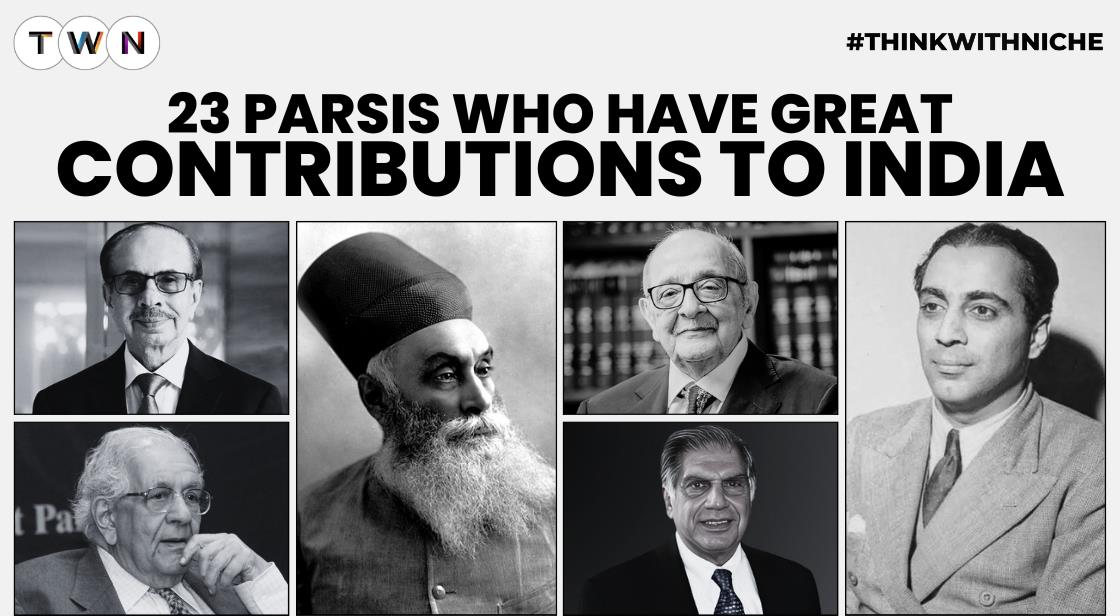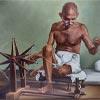23 Parsis Who Have Great Contributions to India

Blog Post
The Parsi community, a small but immensely influential minority in India, has made extraordinary contributions to the nation’s progress. Originating from Persia, they arrived in India in the 8th century to escape religious persecution.
Their journey since then has been marked by resilience, entrepreneurial spirit, and a deep commitment to societal advancement.
Known for their business acumen, the Parsis played a pivotal role in India’s industrial revolution. They established some of the country’s earliest and most successful enterprises, laying the foundation for modern Indian industry.
From the Tata Group, a global conglomerate, to the Godrej Group, renowned for its consumer goods, the Parsis have left an indelible mark on the Indian economic landscape.
Beyond business, Parsis have excelled in various fields, including science, law, medicine, and the arts. Renowned figures like Homi J. Bhabha, the father of India’s nuclear program, and Fali S. Nariman, a legal luminary, are testaments to the community’s intellectual prowess.
Their contributions to nation-building have been immense, and their legacy continues to inspire generations.
Despite facing challenges such as declining population numbers, the Parsi community's spirit of enterprise and philanthropy endures. Their rich history and enduring impact on Indian society make them an integral part of the nation’s tapestry.
This blog post will delve deeper into the lives and achievements of 23 prominent Parsis who have made significant contributions to India. Through their stories, we aim to celebrate the community's rich heritage and its enduring legacy.
In India, the Parsi community is credited with starting the industrial revolution. They have a vast cultural history in India and have made a lasting impression. This article looks at the 23 most renowned Parsis in India. But first, let's go through their history.
A Parsi, often spelt Parsee, is an Indian devotee of the Persian prophet Zoroaster (or Zarathustra). The Parsis are derived from Iranian Zoroastrians who came to India to escape religious persecution at the hands of Muslims. They predominantly live in Mumbai and a few cities and villages to the north, but they also live in Karachi (Pakistan) and Bengaluru (Karnataka, India). They do not form a caste in the strictest sense, but they do form a separate group because they are not Hindus.
The Parsi community in India is credited with initiating India's industrial revolution. They have a long cultural history in India and have left an indelible mark. Here are the Prominent Parsi names associated with making India proud!
23 Parsis Who Have Great Contributions to India
1. Ardeshir Godrej: The Visionary Founder of an Indian Empire
Ardeshir Godrej, a visionary entrepreneur, laid the foundation for one of India's most iconic and enduring conglomerates. Born in 1868 into a wealthy Parsi family in Mumbai, his entrepreneurial journey began unexpectedly.
From Law to Locksmithing
Initially pursuing a legal career, Ardeshir found his true calling in a pharmacy where he developed a keen interest in surgical instruments. This early fascination with precision and craftsmanship would later shape his entrepreneurial endeavors. Recognizing a gap in the market for high-quality, locally manufactured goods, Ardeshir ventured into the production of surgical equipment, laying the groundwork for what would become the Godrej Group.
The Birth of Ardeshir Godrej an Industrial Giant
A turning point in Ardeshir's career came with his observation of the increasing burglary rates in India. This led him to develop and manufacture innovative locks, a product that would revolutionize home security in the country. The Godrej lock, synonymous with trust and reliability, became a household name.
Beyond locks, the Godrej Group expanded its operations to include a wide range of products, from soaps and household appliances to furniture and real estate. The company's commitment to quality, innovation, and customer satisfaction has been instrumental in its enduring success.
A Legacy of Entrepreneurship of Ardeshir Godrej
Ardeshir Godrej's entrepreneurial spirit and business acumen have been passed down through generations of the Godrej family. The company continues to be a leading force in Indian industry, contributing significantly to the nation's economic growth and development.
Today, the Godrej Group is a diversified conglomerate with a strong presence in various sectors, including consumer goods, real estate, agriculture, and engineering. The company's legacy is built on the solid foundation laid by its visionary founder, Ardeshir Godrej.
Key Contributions of Ardeshir Godrej:
- Pioneered the Indian lock industry.
- Diversified the Godrej Group into various product categories.
- Established a strong foundation for a lasting business empire.
- Demonstrated a commitment to quality and innovation.
- Cultivated a legacy of entrepreneurship within the Godrej family.
2. Fali S. Nariman: A Titan of Indian Law
Fali Sam Nariman, a towering figure in Indian jurisprudence, left an indelible mark on the nation's legal landscape. Born in 1929, he rose to prominence as a senior advocate of the Supreme Court of India, renowned for his exceptional legal acumen and unwavering commitment to upholding the Constitution.
A Distinguished Legal Career
Nariman's legal career spanned over seven decades, marked by his involvement in numerous landmark cases that shaped the course of Indian law. His expertise in constitutional law was unparalleled, and he was often called upon to represent the government and private parties in complex and high-stakes litigation.
His contributions to the legal profession extended beyond his courtroom victories. Nariman served as the President of the Bar Association of India from 1991 to 2010, where he played a pivotal role in advocating for the rights of lawyers and strengthening the legal profession.
A Champion of Human Rights and Democracy
Known for his unwavering commitment to human rights and democratic values, Nariman fearlessly defended these principles both within and outside the courtroom. His outspoken criticism of authoritarian regimes and his advocacy for individual liberties earned him widespread respect and admiration.
A Legacy of Excellence
Fali S. Nariman's legacy extends far beyond his legal accomplishments. He was a mentor to countless young lawyers, inspiring them to pursue excellence in their profession. His contributions to Indian law and society have had a profound and enduring impact.
Key milestones in Fali S. Nariman's career:
-
Served as Additional Solicitor General of India from 1972 to 1975
-
Resigned in protest against the Emergency imposed by Indira Gandhi
-
Represented India in numerous international arbitration cases
-
Authored several influential legal publications
-
Honored with the Padma Bhushan and Padma Vibhushan awards
Fali S. Nariman passed away on February 21, 2024, leaving an irreplaceable void in the legal fraternity. His memory continues to inspire generations of lawyers and legal scholars.
3. Byramjee Jeejeebhoy: A Philanthropic Visionary
Sir Jamsetjee Jejeebhoy, often referred to as the "First Citizen of Bombay," was a pivotal figure in 19th-century India. His son, Sir Byramjee Jeejeebhoy, continued the family's legacy of philanthropy and entrepreneurial spirit.
A Legacy of Philanthropy and Enterprise
Born into affluence, Byramjee Jeejeebhoy chose to dedicate his life to serving society. His philanthropic endeavors were far-reaching, with a particular emphasis on education and healthcare. He established renowned institutions such as the Byramjee Jeejeebhoy Medical College in Pune and the Byramjee Jeejeebhoy College in Mumbai, which continue to be centers of excellence in their respective fields.
Beyond education, Byramjee Jeejeebhoy made significant contributions to urban development. In 1830, he acquired a vast tract of land between Jogeshwari and Borivali, which would later become a thriving residential and commercial area. He also developed Bandstand, a popular Mumbai landmark, and constructed the road that bears his name.
Sir Jamsetjee Jejeebhoy: A Business Acumen
While primarily known for his philanthropy, Byramjee Jeejeebhoy was also a shrewd businessman. He leveraged his extensive landholdings to create a substantial property empire, making him one of Mumbai's most prominent landowners.
The Jeejeebhoy family's legacy continues to shape Mumbai's landscape and its philanthropic endeavors. The Byramjee Jeejeebhoy Group, a descendant of the family, remains involved in various business and philanthropic activities, carrying forward the vision of its founders.
Key Contributions of Byramjee Jeejeebhoy:
-
Established renowned educational institutions
-
Contributed significantly to Mumbai's urban development
-
Pioneered philanthropy in India
-
Built a substantial business empire
-
Laid the foundation for a lasting family legacy
Byramjee Jeejeebhoy's life and work serve as an inspiration for generations, demonstrating the power of philanthropy and entrepreneurial spirit in shaping a nation's progress.
4. Homi J. Bhabha: The Architect of India's Nuclear Program
Homi Jehangir Bhabha, a towering figure in the annals of Indian science, is revered as the "father of the Indian nuclear program." Born into a prominent Parsi family in Mumbai in 1909, Bhabha's intellectual brilliance and visionary leadership were instrumental in establishing India as a nuclear power.
Homi Jehangir Bhabha's Academic Career
Educated at the prestigious Cathedral and John Connon School in Mumbai, Bhabha excelled in his studies. He went on to pursue higher education at the University of Cambridge, where he specialized in nuclear physics. His exceptional academic achievements, including the prestigious Isaac Newton Studentship, laid the foundation for his future contributions to the field.
Homi Jehangir Bhabha:The Visionary Behind India's Nuclear Program
Upon returning to India in 1945, Bhabha recognized the immense potential of nuclear energy for the nation's development. With unwavering determination, he established the Tata Institute of Fundamental Research (TIFR) in Mumbai, which served as the cradle of India's nuclear program.
Bhabha's farsightedness and leadership were instrumental in the creation of the Atomic Energy Commission (AEC) in 1948, with himself as its first chairman. Under his guidance, India embarked on an ambitious nuclear program with the twin objectives of harnessing nuclear energy for peaceful purposes and developing nuclear technology for national security.
Homi Jehangir Bhabha: A Global Scientific Leader
Bhabha's contributions extended beyond India's borders. He played a pivotal role in the establishment of the International Atomic Energy Agency (IAEA) and served as its first scientific advisor. His expertise was widely recognized, and he was elected president of the International Union of Pure and Applied Physics.
Tragically, Bhabha passed away in a plane crash in 1966, cutting short his visionary leadership. However, the foundation he laid for India's nuclear program continues to shape the nation's scientific and technological landscape.
A Lasting Legacy
Homi J. Bhabha's legacy is a testament to his exceptional intellect, unwavering patriotism, and farsighted vision. His contributions to science and technology have had a profound impact on India's progress, and his name remains synonymous with scientific excellence.
Key contributions of Homi J. Bhabha:
-
Founded the Tata Institute of Fundamental Research (TIFR)
-
Established the Atomic Energy Commission (AEC)
-
Pioneered India's nuclear program
-
Played a crucial role in the establishment of the IAEA
-
Served as a global leader in the field of nuclear physics
5. Jamsetji Tata: The Father of Indian Industry
Jamsetji Nusserwanji Tata, a visionary industrialist and philanthropist, is often hailed as the architect of modern India. Born into a Parsi family in Navsari, Gujarat, in 1839, Tata's entrepreneurial spirit and farsightedness laid the foundation for the Tata Group, India's largest and most diversified conglomerate.
From Humble Beginnings to Industrial Titan
Tata's journey began in the textile industry. He established the Central India Spinning, Weaving, and Manufacturing Company in Nagpur in 1874, marking the inception of the Tata Group. However, his ambitions extended far beyond textiles.
Driven by a desire to industrialize India, Tata envisioned a nation that could compete on the global stage. He embarked on ambitious projects that would shape the country's destiny. These included the establishment of India's first iron and steel company, Tata Iron and Steel Company (TISCO), which later became Tata Steel, and the hydroelectric power plant at the Tata Hydroelectric Power Supply Company.
Jamsetji Nusserwanji Tata: A Visionary Philanthropist
Beyond his entrepreneurial pursuits, Tata was a fervent philanthropist. He established the Indian Institute of Science (IISc) in Bangalore, laying the groundwork for scientific research and education in India. He also championed the cause of higher education for Indians, with a particular focus on technical training.
Tata's dream of building world-class institutions was driven by his belief in India's potential. He envisioned a nation that was self-reliant and could contribute meaningfully to the global community.
A Lasting Legacy
Jamsetji Tata's legacy extends far beyond his business empire. His unwavering commitment to India's progress, coupled with his philanthropic endeavors, has inspired generations of entrepreneurs and social reformers. The Tata Group, under his visionary leadership, has grown into a global conglomerate, employing millions of people and contributing significantly to the Indian economy.
Tata's emphasis on corporate social responsibility and sustainable development has set a benchmark for businesses worldwide. His pioneering spirit and unwavering belief in India's potential continue to shape the nation's aspirations.
Key contributions of Jamsetji Tata:
-
Founded the Tata Group, India's largest conglomerate
-
Established India's first iron and steel company
-
Pioneered hydroelectric power generation in India
-
Founded the Indian Institute of Science
-
Championed education and philanthropy
Jamsetji Tata's entrepreneurial vision and philanthropic spirit have left an enduring legacy that continues to inspire and shape India's journey towards progress and prosperity.
6. Ratan Tata: The Transformational Leader
Ratan Naval Tata, a visionary industrialist and philanthropist, is synonymous with the Tata Group's meteoric rise to global prominence. His stewardship of the conglomerate from 1990 to 2012, and again briefly in 2016, marked a transformative era for the company and India's industrial landscape.
Ratan Naval Tata: A Catalyst for Change
Ratan Tata's tenure as chairman of the Tata Group was characterized by a bold and strategic approach to business. He spearheaded the group's diversification into new sectors, including automobiles, information technology, and telecommunications, positioning it as a global conglomerate.
His most iconic achievement was the launch of the Tata Nano, an affordable car designed for the Indian masses. While the project faced challenges, it exemplified Tata's commitment to innovation and social responsibility.
Ratan Naval Tata's Philanthropy and Social Impact
Beyond business, Ratan Tata is deeply committed to philanthropy. He has dedicated a significant portion of his time and resources to various social causes, including education, healthcare, and rural development. His philanthropic initiatives have touched the lives of millions of people, making him a revered figure in India and abroad.
Ratan Naval Tata's Legacy of Leadership
Ratan Tata's leadership style, characterized by humility, empathy, and a strong sense of purpose, has inspired countless individuals. He is often credited with instilling a strong ethical framework within the Tata Group, emphasizing the importance of corporate social responsibility.
His contributions to India's economic and social development have earned him numerous accolades, including the Padma Bhushan and Padma Vibhushan, India's highest civilian honors.
Key achievements of Ratan Tata:
-
Transformed the Tata Group into a global conglomerate
-
Launched iconic products like the Tata Nano
-
Championed corporate social responsibility and philanthropy
-
Mentorship and guidance to the next generation of leaders
Ratan Tata's legacy continues to inspire and shape the future of Indian business and society. His vision, leadership, and unwavering commitment to excellence have made him an enduring icon of Indian industry.
Ratan Tata Passes Away at 86
Ratan Naval Tata, the esteemed chairman emeritus of the Tata Group and a towering figure in Indian industry, passed away on the night of Wednesday, October 9, 2024, at the age of 86. He had been receiving treatment for a prolonged illness at Breach Candy Hospital in Mumbai.
Following the news of his passing, there was a widespread outpouring of grief and tributes from across the corporate sector and beyond, as leaders remembered his remarkable contributions to Indian business and society.
Noel Tata Appointed Chairman of Tata Trusts, Succeeding Ratan Tata
Noel Tata Takes Over as Chairman of Tata Trusts
Tata Trusts, which holds a significant 66% stake in Tata Sons, plays a crucial role in the governance of the Tata Group, a conglomerate that spans various industries, including steel, automobiles, and information technology. Under Ratan Tata's leadership, the Tata Group emerged as one of India's most globally recognized brands.
Following Ratan Tata’s passing, and with no direct heirs or designated successors, the board of Tata Trusts convened shortly after his final rites to discuss the leadership transition. The decision to appoint Noel Tata as chairman is said to align with Ratan Tata’s philosophy of ensuring a smooth and timely handover of leadership.
Noel Tata’s new role as Chairman of Tata Trusts marks a continuation of his long-standing involvement with the Tata Group. His leadership will be vital in maintaining the philanthropic and business legacies established by Ratan Tata.
Who is Noel Tata?
Noel Tata has been deeply involved with the Tata Group for over four decades, holding board positions across several key Tata companies, including Tata International Limited, Voltas, and Tata Investment Corporation. He also serves as Vice Chairman of Tata Steel and Titan Company Limited, two of the group's largest enterprises.
As the former Managing Director of Trent, the retail division of Tata Group, Noel Tata played a pivotal role in transforming it into a major force in India's retail market, growing its value to ₹2.8 lakh crore. His leadership abilities were further demonstrated during his tenure as Managing Director of Tata International, where he successfully increased the company's turnover from $500 million to over $3 billion.
Since 2014, Noel Tata has chaired Trent Limited, overseeing a decade of remarkable growth, with the company’s stock value surging by over 6,000%. His strategic expertise and steady leadership have earned him considerable respect both within the Tata Group and across the broader business community.
7. Freddie Mercury
Freddie Mercury, also known as Farrokh Bulsara, was a British singer, songwriter, and record producer who was the main singer of the rock band Queen. He was recognized as one of the best vocalists in the history of rock music because of his flamboyant stage persona and four-octave vocal range. Queen's artistic orientation was motivated by Mercury's extremely theatrical flair, which broke rock frontman traditions.
8. Bahman Pestonji Wadia
In India's Workers' Unions, Pestonji Wadia is regarded as a forerunner. He was an Indian labor activist and theosophist, also known as Bomanji Pestonji Wadia. At first, he was a member of the TS Adyar and later the United Lodge of Theosophists. In 1918, Wadia and V. Kalyanasundaram Mudaliar co-founded the Madras Labour Union, which was one of the first organized labor organizations in India.
9. Dadabhai Naoroji
Dadabhai Naoroji, the "Grand Old Man of India" and the "Unofficial Ambassador of India," was an economist and political activist who was the first to publicly urge India's independence. He was also a trader and writer who served as a Liberal Party Member of Parliament in the United Kingdom House of Commons from 1892 to 1895, the first Asian to do so since Anglo-Indian MP David Ochterlony Dyce Sombre, who was disqualified for corruption. Naoroji is best remembered for his work in the Indian National Congress, where he was a founding member and three times served as president in 1886, 1893, and 1906.
10. Kaikhosrov D. Irani
Professor of Philosophy of Science at City College of New York and former pupil of Albert Einstein. For nine years, he served as Chairman of the philosophy department at City College of New York, where he also taught for 41 years. In addition to the Academy of Science in New York, he was a member of the American Philosophical Association, the Philosophy of Science Association, and the American Academy of Religion. He was a judge for the Templeton Prize, which recognizes persons who believe in the spiritual component of life.
Related: Remembering Ratan Tata: A Visionary Entrepreneur and Compassionate Leader
11. Homi Nusserwanji Sethna
Homi Nusserwanji Sethna was an Indian nuclear scientist and chemical engineer. He rose to international notoriety as the Chairman of the Atomic Energy Commission during the Smiling Buddha nuclear test at the Pokhran Test Range in 1974. He spearheaded India's civilian nuclear program as well as the construction of nuclear power plants. In 1991, he was named Mumbai's Sheriff. The Padma Vibhushan, India's second-highest civilian accolade, was bestowed upon him by the Indian government in 1975.
12. Fali Homi Major
Air Chief Marshal Fali Homi Major, who was born into a Parsi family, was the Indian Air Force's 21st Chief of the Air Staff. He served in a variety of command, staff, and instructional positions during his nearly four-decade-long career. Major handled countless perilous missions with his 7,765 hours of flight time. His helicopter unit participated in operations in Siachen, the world's highest battleground, and commanded a Mi-17 squadron during IPKF operations in Sri Lanka, which included a rescue mission for 11 tourists stranded in a cable car, among other things.
13. Nanabhoy Palkhiwala
Nanabhoy Palkhiwala, another Parsi who was a brilliant jurist and economist, entered the profession in 1946 and immediately excelled as an expressive and fluent barrister. He co-wrote The Law and Practice of Income Tax with Jamshedji Behramji Kanga, which is still considered an authoritative treatise in commercial and tax law. He was a staunch supporter of the right to freedom of expression and the freedom of the press. Indira Gandhi contended in the Supreme Court that newsprint served more than just a basic commodity when she put import bans on it in 1972 to quell opposition.
14. Feroze Gandhi
Feroze Gandhi was an Indian politician and freedom fighter who was the husband of Indira Gandhi and the publisher of The National Herald. Gandhi published two newspapers, The National Herald and The Navjivan. He served in the regional assembly and then the Lok Sabha, India's lower house of parliament, from 1950 to 1952.
15. Jehangir Ratanji Dadabhoy Tata
JRD Tata, the chairman of the Tata Group, was an Indian aviator and industrialist who founded Air India, the country's first commercial airline. In 1929, he became India's first licensed pilot, his mother being the country's first lady to drive an automobile. He is also the founder of the Tata Group's Tata Consultancy Services, Tata Motors, Titan Industries, Tata Salt, and Voltas. He received the French Legion of Honour in 1983 and the Padma Vibhushan and Bharat Ratna in 1955 and 1992, respectively.
16. SH Kapadia
Sarosh Homi Kapadia, another prominent legal figure from the Parsi community, served as India's 38th Chief Justice. He was appointed as an additional judge in the Bombay High Court in 1991 and then as a permanent judge in March 1993. In 2003, he was appointed Chief Justice of the Uttarakhand High Court and was soon elevated to the Supreme Court as a judge. He is arguably most known for his decision in Vodafone v. Union of India, in which he determined that the Indian revenue agency lacked territorial jurisdiction to tax offshore transactions.
17. Pallonji Shapoorji Mistry
Shapoorji, the richest Irish person, is a billionaire construction entrepreneur and chairman of Shapoorji Pallonji Group. Pallonji Mistry was born into a Gujarati Parsi family. His net worth is predicted to be US$28.0 billion as of April 2021. The Hong Kong & Shanghai Bank, the Grindlays Bank, the Standard Chartered Bank, the State Bank of India, and the Reserve Bank of India were all founded by Shapoorji, the group patriarch, around the Fort region. Shapoorji Pallonji Construction Limited, Forbes Textiles, and Eureka Forbes Limited are all owned by Pallonji Mistry's Shapoorji Pallonji Group. He was the chairman of Associated Cement Companies in the past.
18. Cyrus S. Poonawalla
Cyrus S. Poonawalla is an Indian businessman and the chairman and managing director of the Cyrus Poonawalla Group, which comprises the world's largest vaccine maker, the Serum Institute of India. He was placed number 5 on Fortunes' India wealthy list in 2021, with a net worth of $19 billion.
19. Sam Manekshaw
During the Indo-Pakistani War of 1971, Major-General Sam Hormusji Framji Jamshedji Manekshaw, better known as Sam Bahadur, was the first Indian Army officer raised to the rank of field marshal. He fought in the army in five wars during his four-decade military career, starting with World War II as part of the British Army. He was born into a Parsi family in Punjab and fought in the British army during WWI. He played a crucial role in blocking reservations for Scheduled Castes and Scheduled Tribes in the army during his time as COAS.
20. Farokh Maneksha
Farokh Maneksha, a former cricketer from India, is an audio speaker. He represented Bombay in India from 1959 to 1975 and Lancashire County Cricket Club in England from 1968 to 1976. No other Parsi male has played for India since the engineer.
21. Aruna Irani
Aruna Irani is a Hindi, Kannada, Marathi, and Gujarati actress and dancer who has acted in over 500 films, usually in supporting and minor roles. She has won two Filmfare Awards for Best Supporting Actress, for Pet Pyaar Aur Paap in 1985 and Beta in 1992, and has been nominated for a total of ten awards, making her the category's most-nominated actress. Irani was inducted into our list of notable Parsis of India after receiving the Filmfare Lifetime Achievement Award at the 57th Filmfare Awards in 2012.
22. Diana Edulji
Diana Fram Edulji is the first Indian woman to captain a cricket team. She represented India in Test cricket. She was up in a Parsi home in Mumbai and was always interested in sports. She liked to play tennis ball cricket at the railway colony where she grew up. She subsequently switched to cricket after playing junior national basketball and table tennis. Diana went on to become a successful slow left-arm orthodox bowler for the Indian Railways and subsequently the national cricket squad. In 1978, she was named captain of the team. She is still the third most successful wicket-taker in Test cricket.
Related: Republic Day: 73 Events that Shaped India
23. Homai Vyarawalla
Homai Vyarawalla, better known as Dalda 13, was India's first female photojournalist. She worked for the company from the late 1930s through the early 1970s. In 2011, she was awarded the Padma Vibhushan, India's second-highest civilian honor. She was one of the first Indian women to work for a mainstream journal when she started at The Illustrated Weekly of India.
Conclusion
Parsis have traditionally been involved in education, society, and industry. They have guided our country to a prosperous future. Comment here on some of India's most prominent Parsis whose tales have impacted you the most. They have steered our country toward a promising future.
To read this article in hindi please click on this link: भारत के विकास में योगदान देने वाले प्रमुख पारसी
You May Like
EDITOR’S CHOICE












